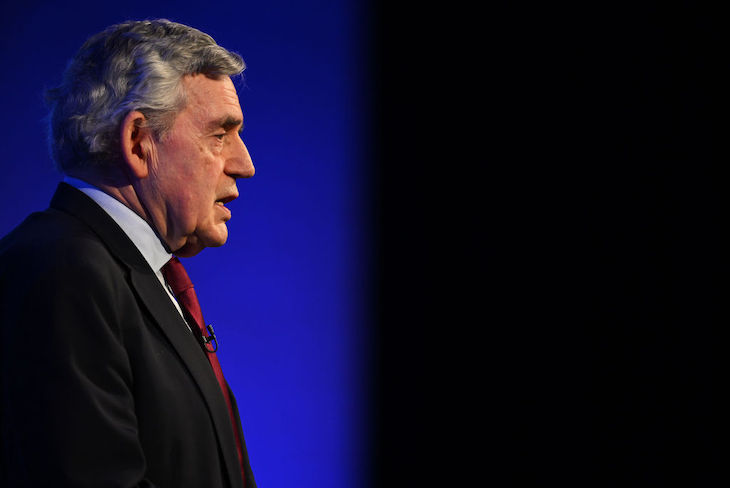Gordon Brown, who is in the news this weekend having come out against assisted dying, occasionally has a tendency to hold back. He held back from standing against his close friend John Smith for the Labour party leadership in 1992, though that was always an unlikely prospect. More agonisingly, he held back from running against Tony Blair for the same role in 1994, sacrificing his personal ambition for the New Labour cause. He even held back from the No campaign in the 2014 Scottish independence referendum, at one point telling a friend ‘They don’t need me,’ until the 11th hour when he tilted the balance and helped save the UK union.
Brown was careful to avoid referring to religious arguments
And in a similar vein, he has over the years drafted a number of interventions that he never pressed send on. Some of these, including an eventually withheld controversial chapter from his own memoirs, will feature in a new biography I’m writing on the former prime minister who, according to recent YouGov polling, is today the most popular Labour figure in the country ahead of, among others, Andy Burnham, Rachel Reeves, Angela Rayner, Keir Starmer and Blair.
Brown’s position on assisted dying – while highly significant, coming as it does ahead of the week in which MPs will vote on the Labour MP Kim Leadbeater’s private member’s bill – is not, in fact, new. He has stated it in several broadcast interviews in recent years but in the end he decided against publishing a draft article on it earlier this year. In that, he had drafted: ‘Assisted suicide is an emotive issue where I personally disagree with what is now becoming a majority position…I worry about legislation that requires a doctor whose role has always been to preserve and extend life, to administer death as the final act of a bureaucratic procedure and I worry too about the pressures to agree such a process that in a fit of depression people may choose a course they might later regret and I worry too if older people feel they have become a burden on their relatives and put themselves under pressure to end their life.’
Brown’s decisive intervention this weekend, in his monthly comment piece for the Guardian which opened movingly with the tragic death of his and his wife Sarah’s baby daughter, was carefully thought through. ‘The experience of sitting with a fatally ill baby girl did not convince me of the case for assisted dying; it convinced me of the value and imperative of good end-of-life care,’ he wrote, before going on to call for a commission on improving palliative care instead of a law change.
A son of the manse, Brown, admired personally by Dr Rowan Williams and the late Cardinal Cormac Murphy O’Connor, retains to this day an ingrained, quiet faith but he was careful to avoid referring to religious arguments in an article which was essentially aimed at influencing an increasingly secular House of Commons.
As well as much reading as ever, Brown was involved in the commissioning of new polling via Focaldata which he leant on to form his arguments. On the surface, the headline figure of that polling showed that more than 70 per cent of the British people record support for assisted dying. Brown knows that the natural instinct of decent people who see terrible deaths is that where there is pain we want to prevent it, and where there is suffering we want to alleviate it. But when we dig deep into what people really want to happen, we find a more complicated picture. When asked whether ‘Labour should prioritise sorting out palliative, social and end-of-life care first before even thinking about assisted dying’, 66 per cent strongly or somewhat agree, and just 20 per cent per cent somewhat or strongly disagree.
Further, there is even more support for a statement which says: ‘Before parliament considers introducing assisted dying there should be a royal commission to examine the future of palliative and end of life care’. Here, more – 69 per cent – are in favour with those against now reduced to 15 per cent. There is a majority for a prior commission which pre-empts any legislation even among those inclined to support assisted dying.
The reasons for this apparent paradox – support for an assisted dying law and yet for a commission and strategy on end of life care before such a law is introduced – becomes clearer when we dig deeper still into the public’s views. People don’t think end of life care is or will be good enough. Only 31 per cent are confident that the government will be able to pay for their end-of-life care in the future as opposed to 53 per cent who are not. And 53 per cent believe – as against 28 per cent who dissent – that given the state of the NHS it would push people into assisted dying if it was made legal.
Brown believes that the responsibility that now falls on government, is clear: to persuade people that we can improve and fund quality end-of-life care and make it available to all on an equitable basis.
Brown spent many weeks planning his intervention this weekend. He is likely to follow it up with broadcast interviews, ahead of the vote on Friday. This time, he didn’t hold back. And it is likely that a number of MPs will be influenced by the comments of this, perhaps the most respected member of the eight-strong living former prime ministers’ club.







Comments